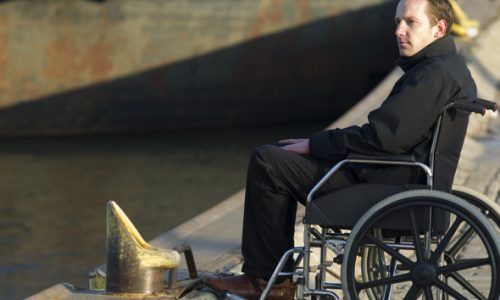Speak to a member of our expert team about your paralysis claim. Find out if you can claim compensation.
CALL 0800 083 5500
To claim compensation for paralysis, it is best to speak with an expert firm of paralysis claim solicitors with experience in dealing with these types of claims.

Contact our team to find out if you can claim compensation for paralysis, and we can help you begin the process of outlining your claim and requesting any medical records that you may need.
Receiving a diagnosis of complete or even partial paralysis can turn a person’s life completely upside down. You could be entitled to make a paralysis claim if it resulted from a severe injury or medical negligence.
Claiming compensation for paralysis can help you get back on track and pay for ongoing treatment and adaptations to your life such as changes to your home or vehicle for example.
There are many types of paralysis, as any part of the body could be injured and theoretically become paralysed. However, there are four main categories of paralysis to be aware of:
Monoplegia – Is the paralysis of a single limb, either a leg or an arm. The rest of the body’s limbs are able to function normally except the affected limb. Monoplegia can occasionally be temporary and is the type of paralysis that is common following a stroke or brain injury.
Hemiplegia – Is paralysis of an arm and a leg on the same side of the body. Like monoplegia, hemiplegia can sometimes be temporary and can be the result of strokes, cerebral palsy or other spinal or brain injuries.
Paraplegia – This is the paralysis of the lower body, usually referring to both legs being paralysed. Paraplegia is less likely to be temporary, as it is usually caused by serious accidents causing severe brain or spinal injuries.
Quadriplegia – Can also be referred to as tetraplegia and is total paralysis of the body from the neck down affecting all four limbs. Quadriplegia can be temporary if it is due to a stroke or certain brain injuries. Quadriplegia is mostly caused by spinal injuries, road traffic accidents as well and traumatic brain injuries.
Paralysis is most often caused by a serious injury or accident, which in turn can lead to brain and spinal cord injuries, a leading cause of paralysis.
In theory, any injury severe enough could lead to a brain or spinal cord injury including road traffic accidents, physical attacks, sporting injuries or industrial workplace accidents.
Any of these incidents could feasibly leave someone with a serious injury and the possibility of becoming paralysed.
Blackwater Law personal injury solicitors successfully obtained £3.2million compensation for Mr Irving who suffered serious spinal injuries and was left disabled after falling down stairs.

Paralysis can in some cases be caused by medical negligence. It is most likely to be caused by a delayed, or misdiagnosis of a condition that could lead to paralysis, such as Cauda Equina Syndrome.
If the signs of spinal cord injuries are not recognised and treated, then there is the possibility of a person suffering from paralysis in the future.
Paralysis can also often be caused by strokes, and if there is a failure to diagnose and/or earlier treat the symptoms of an oncoming stroke, then there could be grounds for a medical negligence claim for paralysis.
There is also the possibility that errors during surgery could lead to paralysis, although this would be extremely rare. If someone was undergoing surgery for a spinal injury there is a chance that errors on behalf of the medical team could lead to paralysis.
Compensation for paralysis will depend largely on the type and severity of paralysis, as well as the long-term impact that it will have on the individual’s life.
If the paralysis means that you are no longer able to continue working or continuing in the line of work that you were in prior to the accident or medical negligence, you could make a claim for loss of earnings to limit the impact of the financial losses.
Your compensation will be broken down into what is known as General Damages and Special Damages. General Damages are compensation for the pain, suffering and loss of amenity that you have endured and include the psychological trauma that would understandably occur following a diagnosis of full or even partial paralysis.
Special damages are paid to account for out-of-pocket expenses/financial costs you incur because of the negligent accident or medical treatment, such as the aforementioned loss of earnings, and include the ongoing costs to you that are likely to follow full or partial paralysis. This would include ongoing medical treatments, the cost of care and assistance and any modifications that are required to your home or vehicle for example.
Compensation for paralysis can be on the higher side of medical negligence and personal injury pay-outs, due to the catastrophic impact it can have on a person’s life and their family.
You have 3 years to bring forward a claim for serious personal injury or medical negligence. This can be 3 years from the incident that caused the paralysis itself, or if it was not until later that you became aware of negligence, then it is 3 years from the date you became aware of any negligence that led to your paralysis.
There are some exceptions to this time limit. Notably, if the person in question is under the age of 18, then the 3-year time limit will not begin until they turn 18.
Limitation periods can often be tricky to establish, especially in cases of medical negligence. If you are unsure when your limitation period may have started, your best course of action is to speak with a member of our team who can help you establish a timeline of events.
When you call us and receive free initial legal advice, if we believe you or your family member may be entitled to compensation for paralysis, we will agree to represent you in your claim on a no-win, no-fee basis. This means that there is no risk to you.
If your paralysis claim is unsuccessful, you will not have to pay any legal fees. Blackwater Law undertakes all medical negligence and personal injury claims on a no-win, no-fee basis.
It is essential to the success of your paralysis claim that you choose the right solicitors.
Having a solicitor that is experienced in dealing with claims like the one you are making, will help to ensure your claim runs as smoothly as possible, and that you are able to secure the maximum amount of compensation for you and your family.
Blackwater Law is ranked by The Legal 500 as a leading provider of legal services for serious personal injury claims and medical negligence claims including paralysis. Speak to an experienced member of our team today about your claim and see if you are entitled to compensation.